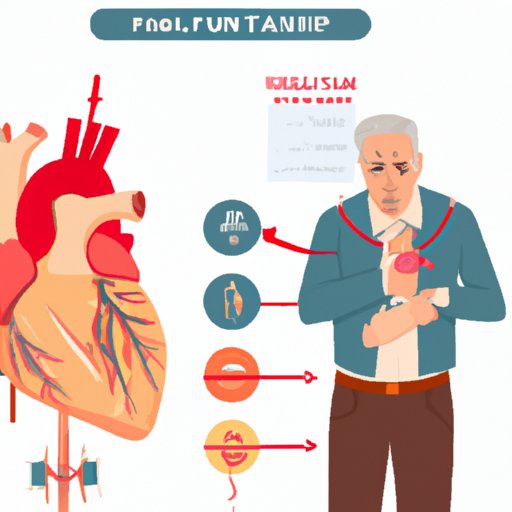
Introduction
Congestive heart failure is a chronic and progressive condition that affects about 5 million Americans and is one of the leading causes of hospitalization in people over 65 years old. It happens when the heart can’t pump enough blood to meet the body’s demands, leading to fluid buildup and symptoms that can affect every part of the body.
Early detection and treatment are crucial for improving outcomes, preventing complications, and maintaining a good quality of life. This article outlines the ten most common symptoms of congestive heart failure, how to recognize warning signs, how to manage the disease, and what lifestyle adjustments can make a significant difference.
10 Common Symptoms of Congestive Heart Failure to Watch Out For
Recognizing the classic symptoms of congestive heart failure can help you or someone you care for seek medical help early. Some of the most noticeable symptoms include:
1. Shortness of breath
Shortness of breath or dyspnea often occurs during physical activity or when lying down flat. It happens when the lungs can’t receive the oxygen they need to keep your body running properly.
2. Fatigue or weakness
Muscle weakness or unusual fatigue is another telltale sign of congestive heart failure. It can occur even after mild exertion and make it difficult to perform daily tasks or regular activities.
3. Swelling in legs, ankles, or feet
Edema or fluid retention can lead to swelling in the lower extremities, which can worsen over time. The skin may feel tight and shiny, and there may be a noticeable indentation when you press the affected body part.
4. Rapid or irregular heartbeat
An abnormal or irregular heartbeat or palpitation may result from a lack of oxygen or blood supply to the heart or from a dysfunction of the heart’s electrical system. It may feel like a fluttering, racing, or pounding sensation in the chest.
5. Chest pain or discomfort
Chest pain or discomfort is a classic symptom of any heart-related condition, including congestive heart failure. It can feel like pressure, tightness, or a squeezing sensation that typically lasts for a few minutes and can spread to the arms, neck, jaw, or back.
6. Persistent cough or wheezing
A cough or wheezing that lingers for weeks or months and doesn’t go away even with treatment may indicate fluid buildup in the lungs, a hallmark symptom of congestive heart failure.
7. Loss of appetite or nausea
Anorexia or loss of appetite is a common symptom of congestive heart failure, likely due to a lack of blood flow to the digestive tract. It can cause nausea, indigestion, and bloating and make it challenging to adhere to a healthy diet.
8. Confusion or impaired thinking
Reduced blood flow to the brain and other organs can interfere with cognition, memory, and executive function, leading to confusion, impaired judgement, and difficulty concentrating.
9. Increased need to urinate at night
Nocturia or having to urinate more frequently at night can be a symptom of congestive heart failure. It happens because when lying down, fluid from the legs and feet moves up to the kidneys, leading to more urine production.
10. Sudden weight gain
A sudden weight gain of two or three pounds in a day or five pounds in a week may signal fluid buildup and should prompt immediate medical attention.
The Warning Signs of Congestive Heart Failure: Recognizing Symptoms Early
Early detection of congestive heart failure is crucial for preventing complications, managing symptoms, and improving outcomes. Some red flags to watch out for include:
Difficulty breathing
Shortness of breath is one of the most common symptoms of congestive heart failure and usually gets worse with physical activity or when lying down flat. It may occur suddenly or gradually and can be accompanied by a cough, wheezing, or chest tightness.
Severe fatigue or weakness
Unusual fatigue or weakness not explained by other health conditions may indicate heart failure. It can make it challenging to perform daily tasks or physical activity and can cause muscle wasting or atrophy over time.
Swelling in legs, ankles, or feet
Persistent edema may be a sign of congestive heart failure or other conditions affecting lymphatic or blood flow. It can be accompanied by tight and shiny skin, redness, or tenderness and may make it difficult to wear shoes or walk.
Rapid or irregular heartbeat
An abnormal heart rhythm may indicate that the heart is not pumping blood effectively or that there is an electrical malfunction. It can lead to chest discomfort, shortness of breath, or lightheadedness.
Difficulty sleeping or lying down flat
Shortness of breath or coughing can make it challenging to sleep or rest comfortably. It may lead to waking up feeling restless, anxious, or choking and can significantly impact daily life activities.
Unexplained weight gain or loss
Sudden changes in weight, especially those not attributed to diet or exercise, may signal fluid buildup or other metabolic imbalances related to congestive heart failure.
Breaking Down Congestive Heart Failure Symptoms: What You Need to Know
Understanding each symptom of congestive heart failure and how to manage it can help you stay on top of the disease and improve your quality of life. Here’s a closer look at each symptom and what you need to know:
Shortness of breath
Shortness of breath is the most common symptom of congestive heart failure and often happens during exercise or while resting. It’s caused by fluid buildup in the lungs, which can make it difficult to breathe deeply and can cause a persistent cough.
Fatigue or weakness
Fatigue and muscle weakness may occur due to a lack of oxygen-rich blood to the body’s organs and tissues. It can make it challenging to perform daily tasks or physical activity and may cause pallor or clammy skin.
Swelling in legs, ankles, or feet
Edema or fluid retention in the lower extremities may occur because the heart can’t pump blood effectively and fluid gets backed up in the surrounding tissues. It can cause discomfort, severe pain, or a decreased range of motion and flexibility.
Rapid or irregular heartbeat
A rapid or irregular heart rate can occur because the heart is pumping inefficiently or has an underlying electrical or arrhythmia problem. It may cause palpitations, chest discomfort, or anxiety.
Chest pain or discomfort
Chest pain or tightness is a common symptom of congestive heart failure, particularly when the heart is not receiving enough oxygen-rich blood. It may occur suddenly or gradually and can spread to the arms, jaw, neck, or back.
Persistent cough or wheezing
A cough or wheeze that lasts for weeks or months and is not relieved by medication may indicate fluid buildup or infection in the airways. It can make it challenging to sleep or perform daily tasks.
Loss of appetite or nausea
Lack of appetite or nausea may result from an imbalance in the digestive or circulatory system. It can lead to dehydration, malnutrition, and a decreased quality of life if not managed correctly.
Confusion or impaired thinking
Reduced blood flow to the brain and other organs can interfere with cognition, memory, and executive function, leading to confusion, impaired judgement, and difficulty concentrating.
Increased need to urinate at night
Nocturia or having to urinate more frequently at night may interfere with sleep quality and hydration levels. It can also be a sign of other urinary or metabolic disorders that need medical attention.
Sudden weight gain
A sudden weight gain may indicate fluid buildup due to congestive heart failure or other metabolic imbalances. It’s essential to weigh yourself regularly and report any significant changes to your healthcare provider.
Managing Congestive Heart Failure: Understanding Symptoms and Treatment
Managing congestive heart failure requires adherence to a robust treatment plan that often includes medication, lifestyle modifications, and monitoring symptoms closely. Here are some things to know regarding treatment:
Treatment options for CHF
Several medications can alleviate symptoms and reduce the risk of complications in congestive heart failure patients. They include ACE inhibitors, beta-blockers, diuretics, digitalis, and anticoagulant drugs.
How CHF symptoms factor into treatment decisions
Healthcare providers may consider several factors when deciding on the most appropriate treatment plan and dosages, including the patient’s age, overall health, lifestyle, and symptom severity.
Exploring lifestyle modifications that may help lessen symptoms
Some lifestyle modifications may help manage congestive heart failure symptoms, including a heart-healthy diet, exercise, smoking and alcohol cessation, stress management, and weight management.
Detecting Congestive Heart Failure Symptoms: A Comprehensive Guide
Diagnosing congestive heart failure may require several medical tests and exams, including:
Physical examination and medical history
Healthcare providers may evaluate your symptoms, medications list, and family history to determine the likelihood of congestive heart failure and other comorbidities.
Blood tests
Lab tests can help detect underlying health issues that may contribute to congestive heart failure, such as anemia, thyroid dysfunction, or kidney disease.
Electrocardiogram (ECG)
An ECG can detect heart rhythm irregularities, damage to the heart muscle, or other heart-related issues.
Echocardiogram
Echocardiography uses sound waves to create images of your heart and can assess heart size, function, and other structural abnormalities.
Cardiac catheterization and angiography
Cardiac catheterization and angiography involve inserting a special dye into your arteries to look for blockages or other circulation problems that may lead to congestive heart failure.

Living with Congestive Heart Failure: Coping with Symptoms and Lifestyle Changes
Living with congestive heart failure can be challenging, but there are several things you can do to manage your symptoms and improve your quality of life. Here are some tips:
The emotional impact of CHF
Congestive heart failure can lead to depression, anxiety, or other mood disorders that require attention and care in addition to physical symptoms.
How to cope with CHF diagnoses
Coming to terms with the diagnosis of congestive heart failure can be challenging, but seeking support from family, friends, or support groups can make it more manageable.
Discussing lifestyle changes that can help reduce symptoms and improve quality of life
Some lifestyle modifications that can improve congestive heart failure symptoms and quality of life include smoking cessation, maintaining a healthy weight, eating a heart-healthy diet, managing stress levels, and regular exercise.
Conclusion
Congestive heart failure is a chronic condition that requires close monitoring and management to improve outcomes, prevent complications, and maintain a good quality of life. Understanding the common symptoms, recognizing warning signs, and adhering to a comprehensive treatment plan can help manage the disease and improve overall health and well-being.




